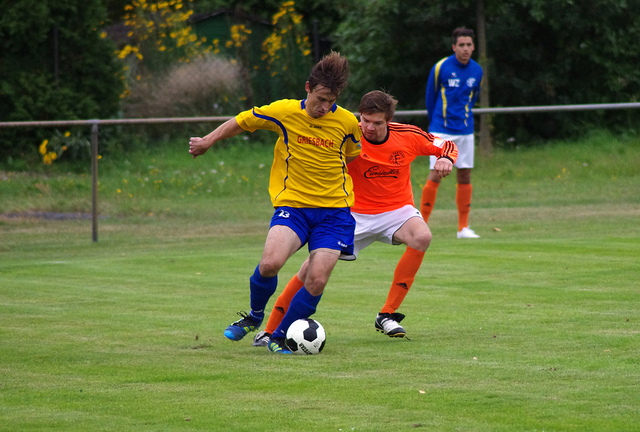Besides the financial problems, the lower leagues in Germany have to face up to another challenge lying in the years ahead: a shrinking society. While the East of Germany suffered a loss in population of around 1.5m since 1989, Germany’s overall population is shrinking according to recent research results. The result is a constantly changing league system where the number of teams is varying, often declining.
A sad example that comes from close to home: the SG Traktor Brumby, a small sports club in Saxony-Anhalt has been disbanded in December 2013. The reason: there are simply not enough people to keep the club afloat or get a team altogether to play league football at the weekend. Other sections of the club, handball and volleyball, have suffered the same fate. Besides the playing squads, the youth were reluctant to take responsibilities in the running of their club.
In the case of Brumby this has manifold reasons. For once, the region is one of the weakest in Saxony Anhalt from an economical point of view. People have to commute long and far for work. Therefore, their time for friends and families has become precious; sport is the obvious choice to cut back, despite sports being one of the best social networks. Secondly, the region is thinly industrialized and offers only few agricultural jobs.
The football section was only established in 1995 and immediately stirred up the local leagues. However, it was not enough to save the sports club as a whole and little by little, sections lost members. The local paper ‘Volksstimme’ reports that the decline was a slow and creeping one but irreversible at least since 2003. Then the handball section of the club lost almost 2 entire teams to neighbouring towns and villages: from 32 players only 13 remained.
In normal circumstances, the 60th anniversary is a reason to celebrate. Not so for Traktor Brumby. In 2008 it has become clear that it was only a question of time until the club finally will fold. Last, the 65th no celebrations were held and in December it was the end of another piece of local sport and tradition.
The problem is not limited to sports associations and clubs but also local fire brigades and other insitutions of parish life. Mario Dingethal however, has pointed out that despite the negative trends, there are still people getting involved in sports clubs or any such organizations to keep them alive, to give the young posibilities to do sports or engage otherwise socially.
The overall trend in East Germany saw 72 football clubs fold between 2010 and 2013, resulting in the staggering figure of 400 teams that have now gone missing from local football, writes Eric Böhm.
As big as the problems of East German football are, dwindling numbers of players have been reported from the West, too. From the neighbouring federal state of Saxony Anhalt, Lower Saxony, Hardy Grüne reports about similar problems. His village Langenhagen he says, established a new club with 2 villages nearby in order to keep the football going. As a result, the youth section looks promising once more and some local pride is returning to the area.
Such an idea has been declined by Neckarsteinach, in Baden-Wurttemberg who suffer similarly like Brumby. Yet, agreeing to establishing a regional club has so far been beyond them. Too much local pride reports Wolfgang Brück. He adds further that 4000 teams have folded within a year (though he does not specify which year) in Germany. This is a sad and astonishing figure.
These are grave social issues German society as a whole has to face up to. It is questionable whether this can be tackled by government programmes or if local football is destined to die a slow death. Also, it is doubtful that the DFB will launch programmes to support struggling local sides. The German national team is just too successful to take the eyes off, nor will the squad of Jogi Löw make a stand for local football. Yet, the corrosion begins from the bottom and will surely creep through the system.
photo credit: © SG Blau Gelb Laubsdorf CC BY 2.0

